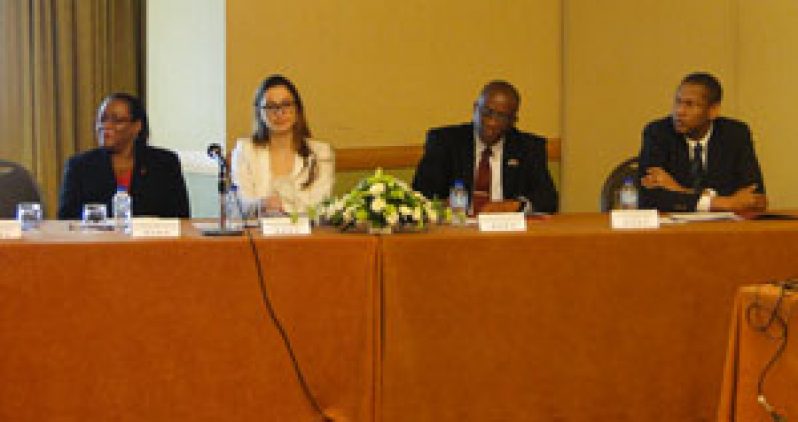THE Inception Workshop for the 10th European Development Fund (EDF) Project, titled ‘Improving Caribbean Food Security in the context of Climate Change’ was held at the Hyatt Regency Hotel in Trinidad on May 14 & 15, 2013.
 Stating that this was a timely launch, in the delivery of the Feature Address, Mrs. Stephanie Elder-Alexander, Deputy Permanent Secretary in the Trinidad and Tobago’s Ministry of Food Production said that with climatic variability, ‘Trinidad and Tobago, and the wider Caribbean, is not immune to these developments’.
Stating that this was a timely launch, in the delivery of the Feature Address, Mrs. Stephanie Elder-Alexander, Deputy Permanent Secretary in the Trinidad and Tobago’s Ministry of Food Production said that with climatic variability, ‘Trinidad and Tobago, and the wider Caribbean, is not immune to these developments’.
Stating that ‘such developments have indications for soil fertility and suitability for crop production, crop and forage productivity, livestock production, proliferation of insect pests and diseases and changes in water supply’. Hailing the Project as ‘a much anticipated and overdue initiative for Trinidad and Tobago and the wider Caribbean’, she outlined the establishment of national gene banks in participating countries and the Regional invitro laboratory to be located in Barbados as key outcomes of the Project.
Also addressing the audience were Ms. Kathrin Renner, EU Representative, Delegation of the European Union to Trinidad and Tobago; Assemblyman Godwin Adams, Secretary of Agriculture, Marine Affairs, Marketing and the Environment, Tobago House of Assembly (THA) and Mr. Bruce Lauckner, Officer in Charge, Caribbean Agricultural Research and Development Institute (CARDI).
Providing a synopsis of the Project, Mr. Norman Gibson, Project Coordinator outlined the overall outcome of the Project which is to ‘to ensure food supplies over the long term, in the midst of the constantly changing agro-ecological environment and for conserving and utilizing the selected germplasm’. The Project will extend over a thirty-six month period.
Mr. Ashton Stanley, Permanent Secretary of the Ministry of Agriculture and Marine Resources in St. Kitts and Nevis said that ‘this project, via the setting up of a tissue culture laboratory, will help with the preservation of land races and varieties of sweet potatoes, in particular’.
These sentiments were echoed by Dr. Dennis Blackman, Deputy Chief Agricultural Officer at Barbados’ Ministry of Agriculture. Dr. Blackman notes that the Project is compatible with recent initiatives of the Barbadian Ministry, aimed at reducing the food import bill. Barbados currently produces cassava, sweet potato and breadfruit flour. Plans are afoot to expand the cassava value chain, with current production of cassava flour and chips. This Project will assist in preserving germplasm and improving food security. He says, as a Region ‘we have to be able to feed ourselves’.
Ms. Cheryl Ramroop, Agricultural Officer with the Ministry of Food Production, Trinidad and Tobago stated confidently that the role of the ministry will be that of ‘mobilising farmers and acting as facilitators for this project’.
Belize is a Centre of Excellence for corn and green legumes and currently exports to Guatemala, Guyana and Jamaica, with potential to export to El Salvador and Honduras, says Mr. Anil Sinha, CARDI Country Representative in Belize.
He says that as a major producer of corn and beans, increasing temperatures can have an impact on production levels, therefore it would be useful to have climate resilient crops – a result of this Project. CARDI Belize also currently commercially produces hot pepper seeds (Moruga Red and West Indian Red).
Collaborating partners in this Project include the University of Wageningen and the Trinidad and Tobago Agri-Business Association (TTABA). The target Caribbean countries are Barbados, Belize, St Kitts/Nevis and Trinidad and Tobago.



.jpg)










